Ten photos of the day are attached.
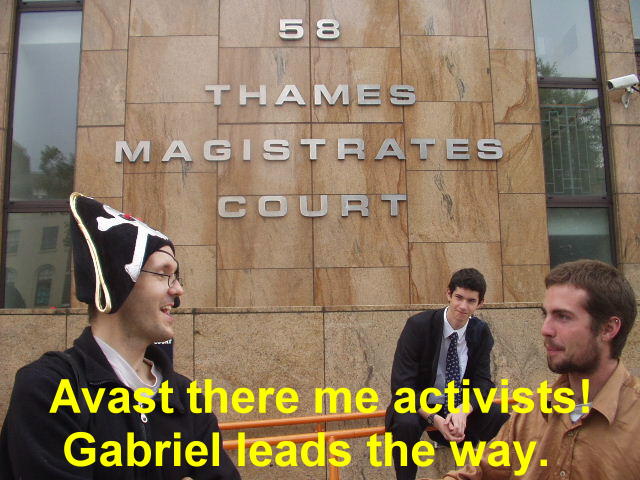
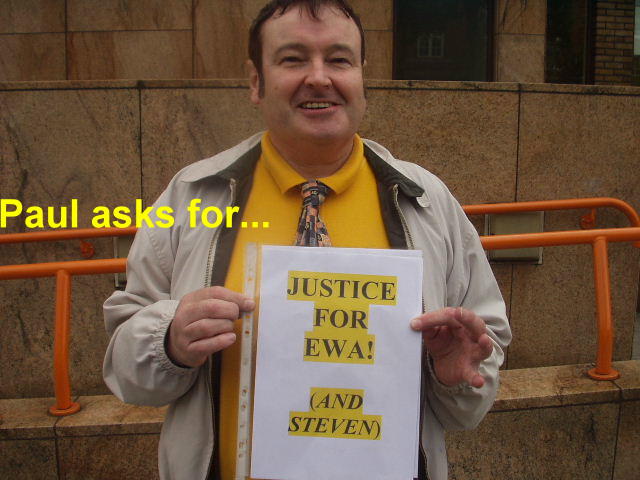
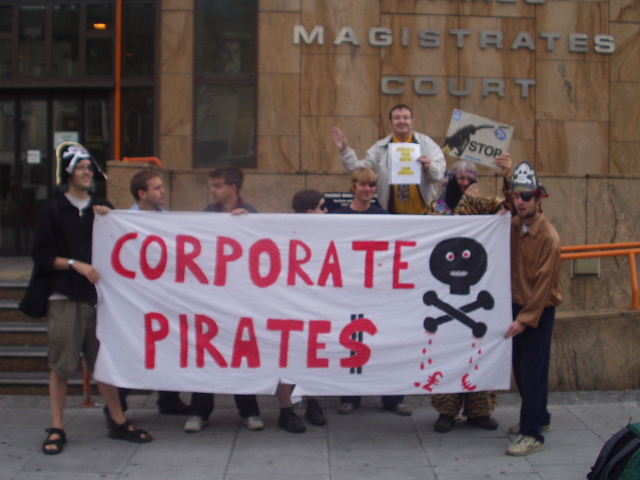
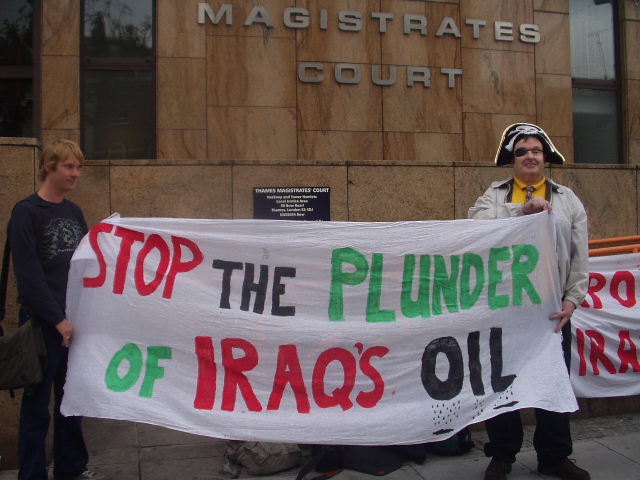
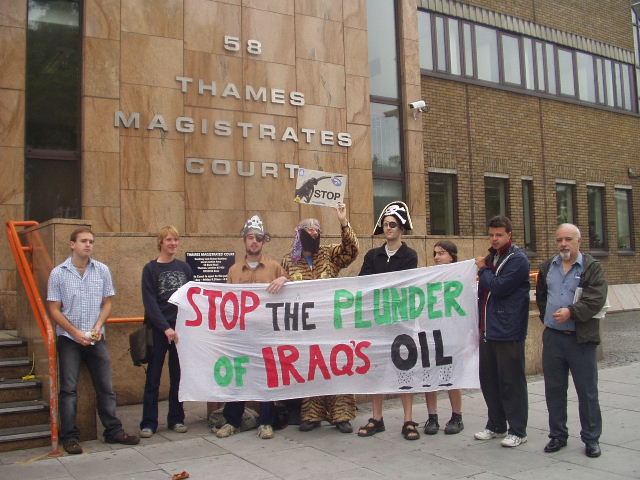
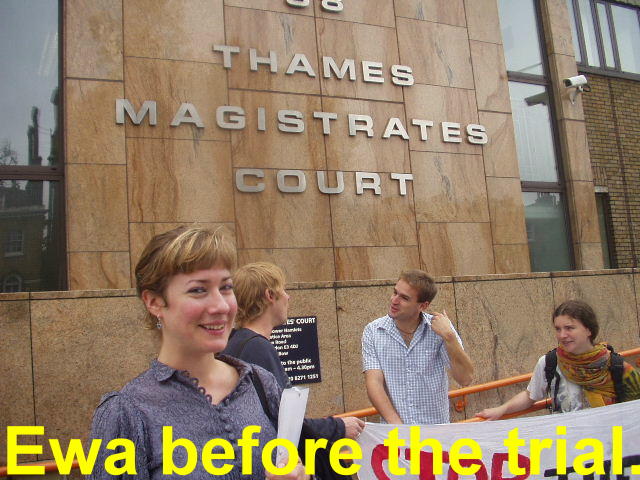
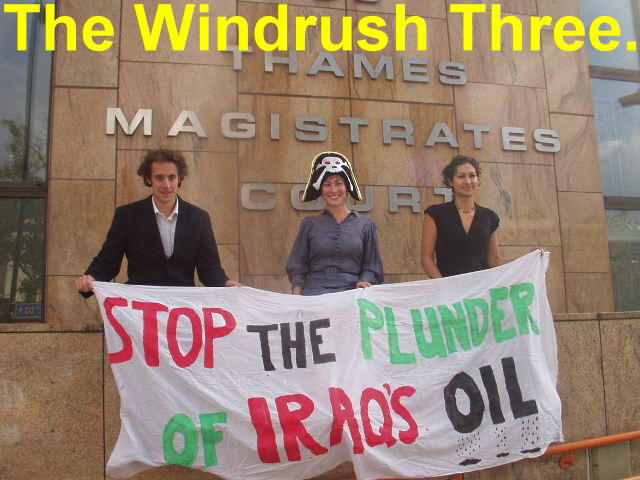
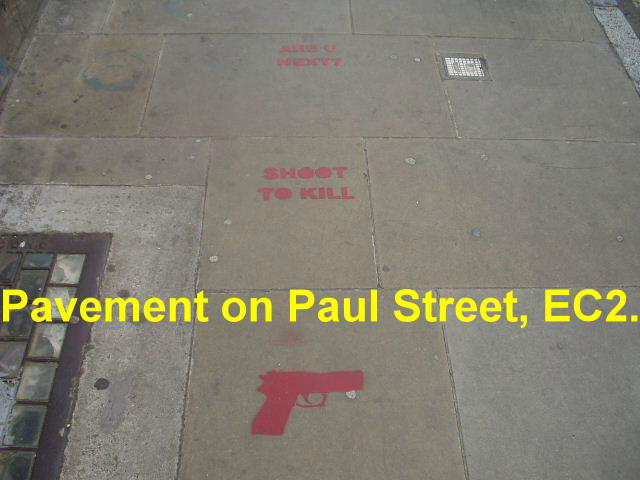
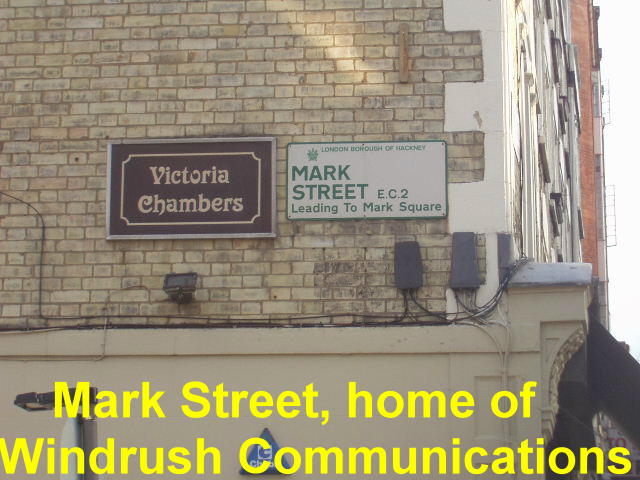
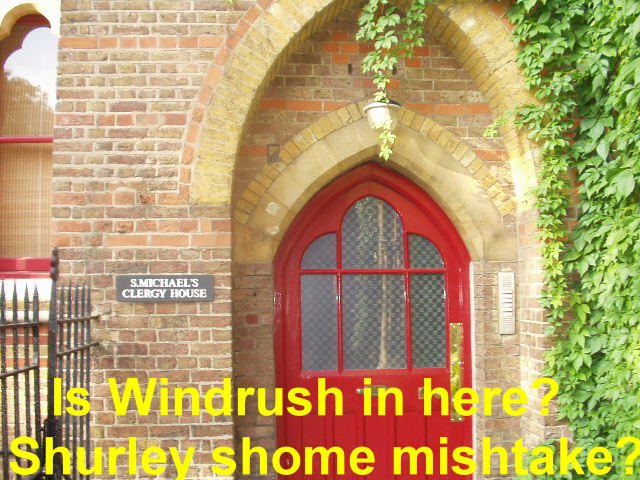
Three activists including Ewa Jasiewicz and Stephen Barnes appeared at Thames Magistrates’ court in Bow Road, East London on Wednesday 14th September.
Ewa and Stephen who were arrested for ‘Aggravated Trespass’ – during an occupation of Windrush’s offices in London last December – argued that they were attempting to prevent a crime, namely the illegal sell-off of Iraqi assets.
Here is the press release, which gives background on the case:
VOLUNTEER PIRATES NEEDED FOR IRAQ COURT CASE DEMO.
NEXT WEDNESDAY (14 SEPT)
PRESS RELEASE
Wednesday September 7th 2005
Pirates put Iraq plunder on trial
Thames Magistrates’ Court, Bow Road E3, 9.30 am,
Wednesday 14 September:
Two activists who occupied the offices of Windrush
Communications – the organizer of a string of Iraq-related business conferences – will challenge the legality of privatization measures imposed on Iraq by the US and UK at their trial next Wednesday. A motley collection of
pirates, carrying a banner saying ‘STOP THE CORPORATE PLUNDER OF IRAQ’ will be outside the court from 9.30am to help draw attention to the case.
Steven (Stephen) Barnes (30) and Ewa Jasiewicz (27) – who were arrested for ‘Aggravated Trespass’ – during an occupation of Windrush’s offices last December – will argue that they were attempting to prevent a crime, namely the illegal sell-off of Iraqi assets. This case represents the first
ever legal challenge to the economic reforms imposed on Iraq.
In September 2003 the US occupation authorities passed a law permitting the sale of Iraq’s non-oil industries to foreign buyers [A] – exactly the sort of “major structural economic reform” that the UK Attorney-General had stated would “not be authorized under international law” [B]. Since then
Windrush Communications has organised a series of ‘Iraq Procurement’ conferences, bringing together major Western corporations such as Shell and Bayer, and representatives from the US, British and Iraqi governments [C].
Ewa Jasiewicz - who spent nine months living in occupied Iraq and works closely with the Iraqi trade union the General Union of Oil Employees [D], which is resisting the privatisation of Iraq’s oil - said: “Modern day pillage looks like this. Occupiers do not have the right to restructure a country’s economy in this manner. What was illegal in September 2003 is still illegal now. This case will finally see the economic occupation of Iraq on trial.”
The defendants are seeking disclosure of all advice given to the British Government by the Attorney General. A refusal may see Lord Goldsmith summoned. Expert evidence from Academics and Journalist Naomi Klein is also expected to be heard at the trial.
Contact: Ewa Jasiewicz 07749 421 576 or
 freelance@mailworks.org
freelance@mailworks.org NOTES
[A] See
 http://www.guardian.co.uk/international/story/0,3604,1046868,00.html
http://www.guardian.co.uk/international/story/0,3604,1046868,00.html [B] See
 http://www.guardian.co.uk/elsewhere/journalist/story/0,7792,1062049,00.html
http://www.guardian.co.uk/elsewhere/journalist/story/0,7792,1062049,00.html [C] See
 http://www.iraqdevelopmentprogram.org
http://www.iraqdevelopmentprogram.org [D] See
 http://www.basraoilunion.org
http://www.basraoilunion.org The trial started at ten to eleven on Wednesday morning and was initially expected to go on for 3 days but as it transpired was concluded in just one day. There was a small but lively protest outside the court with a number of activists dressed up as pirates holding banners reading `CORPORATE PIRATES` and `STOP THE PLUNDER OF IRAQ’S OIL`. At a little after ten O’clock four police vans were seen parked outside the court and at one point 8 uniformed officers confronted 5 protesters (the rest were inside the court by then). Cameras are prohibited in court though one activist did get some photos from the court window.
I took notes but found it difficult to hear all that was said through the slatted Perspex screen separating the public gallery from the court. The district judge at the trial was a Mrs Comyns who at times seemed unaware of many of the terms used and had to be advised that the CPA was the Coalition Provisional Authority (now defunct).
Stephen tactically withdrew and was sentenced to be bound over to keep the peace for two years in a sum of 500 pounds.
Ewa and a colleague went ahead and the defence team then argued that the occupation was obliged to abide by the Geneva Conventions. The judge suggested that the defence was merely complaining about the transfer of state owned utilities to privately owned ones. She also spoke rather disparagingly of “Your protesters for peace…” Her privileged background came through to me when she pronounced the word `involves ` as `invulves`. I thought she gave me a quick glare at one point when I yawned (I had just travelled down from Edinburgh on the overnight train). Fortunately I was not sent to the tower.
Mr Martin Rackstraw for the defence maintained that the last two years of the occupation was a war crime. A point, which might be made here, is that a war crime is not necessarily a crime of violence.
Mr Hugo Keith represented the crown and there was a witness from the Attorney General’s office, Mr David Perry but he was not called.
The arguments went on from 10.50 to 14.37 with a one-hour lunch break and one short recess at 11.14 and at the end Ewa and her colleague were bound over to keep the peace for 2 years in the sum of 300 pounds.
Afterwards there was feeling among the activists that the trial had been worthwhile in the sense that it did at least gain some publicity for the legal arguments over the disposal (or perhaps pillage) of Iraq’ assets. Also the attorney general’s office felt obliged to send a representative and his relief at the end of the hearing was obvious – “Right it’s over!” he was heard to say on the way out - he had perhaps feared the Attorney General himself (Lord Goldsmith) might have been called.
Gabriel Carlyle of Voices UK (www.voicesuk.org) said: “I think they did as much as they could do under the circumstances - considering that the court wasn’t sympathetic to say the least.”
Ewa Jasiewicz of Iraq Occupation Focus (www.iraqoccupationfocus.org.uk) said “The prosecution themselves said they did not want a show trial.” She felt the day had gone fairly well.
After the trial we said our goodbyes and I went to have a look at the Windrush building in Mark Street, London EC2. I walked from Old Street tube station and went along Paul Street to Mark Street expecting to see a large corporate building with the name `Windrush` and perhaps a corporate logo but the nearest thing which looked like that was a building called Telephone House. I found Mark Street and walked the length of it twice asking several locals but couldn’t spot it. I was told it was in a building called `The Clergy House` - I inspected all the nameplates but Windrush wasn’t one of them. Who knows? Maybe the activists’ efforts have put them out of business!
Ten photos of the day are attached.
Word Count 1,124 words

 e-mail:
e-mail:
Comments
Display the following comment